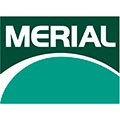 Merial Animal Health used its presence at the 24th International Pig Veterinary Society Congress (IPVS) in Dublin to highlight the threat of Swine Respiratory Disease (SRD) and its control in pig herds in the UK and Ireland.
Merial Animal Health used its presence at the 24th International Pig Veterinary Society Congress (IPVS) in Dublin to highlight the threat of Swine Respiratory Disease (SRD) and its control in pig herds in the UK and Ireland.
SRD remains a significant problem for the swine industry1. Associated production losses include 30-70% morbidity, a mortality rate of 4-6% (and even higher in severely affected units), decreased feed efficiency and reduced growth rates2.

Findlay MacBean, Merial’s Head of Livestock Business UK and Ireland explained that efficient and effective control of SRD requires fast action from herdsmen and vets. He said: “Normally an antibiotic treatment will be required to control SRD, prescribed by the pig unit’s veterinary surgeon. It’s important that the product used reaches the target area in the lungs quickly (ideally within 30 minutes of administration) and stays there for an extended period to minimise tissue damage and resolve the clinical signs of pneumonia. To minimise stress in animals with SRD a low-dose, one-shot treatment is preferable.”
SRD-causing bacteria can affect pigs of any age, but growing pigs are the most affected and experience the biggest production loss.
Infections of Actinobacillus pleuropneumoniae (App) can cause sudden death, and if not treated immediately can cause severe lung damage and mortality3. Haemophilus parasuis (Hps) bacteria can cause lung damage, and outbreaks in young pigs can lead to rapid and high mortality rates2. While Pasteurella multocida (Pm) is often a secondary bacterial infection, usually found in association with App, Hps and viral infections, it causes loss of condition and reduced growth rates2.
Preventing SRD is complex. Reducing the level of aerial pollutants, strict on-farm hygiene, single sourcing of piglets and attention to biosecurity can help to prevent outbreaks. Vaccination may be useful, particularly on breeder-feeder farms where there is a continuous flow of piglets reaching an age where maternally-derived immunity is lost and they become susceptible to disease, allowing disease to perpetuate within the herd4.
Returning pigs that have suffered with SRD to the main herd is often ill-advised. Sick pigs are often chronically affected and can act as a source of infection4. A considered health management plan should include quarantine measures which enable healthy pigs and sick pigs to be separated until finishing or they leave the unit.
Mr MacBean concluded: “Reducing losses from SRD requires an effective disease management programme. Ideally this involves a suite of preventative measures, including herd health plans, vaccination where appropriate and fast action to control outbreaks.”
References
1) VanAlstine W. (2012). Chapter 21 Respiratory System. In: Diseases of Swine. 10th Edition p. 348. Wiley Blackwell.
2) Opriessnig T. et al. (2011). Polymicrobial respiratory diseases in pigs. Animal Health Research Review 12 (2); 133-148.
3) Bossé J.T. et al. (2002). Actinobacillus pleuropneumoniae: pathobiology and pathogenesis of infection. Microbes and Infection. 4: 225-235.
4) NADIS, Respiratory Disease in Growing Pigs Module Part 1 and Part 2.
August 1, 2016 - Merial


